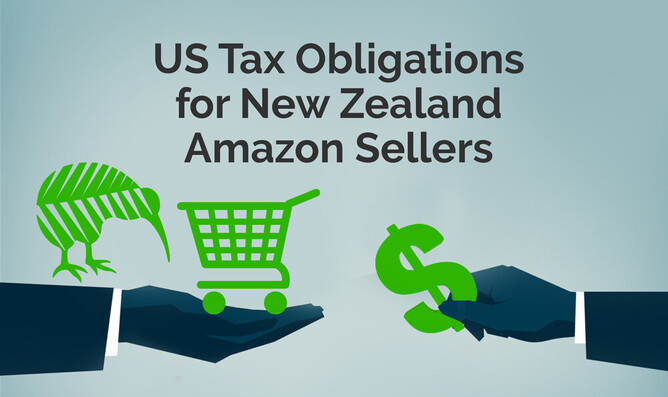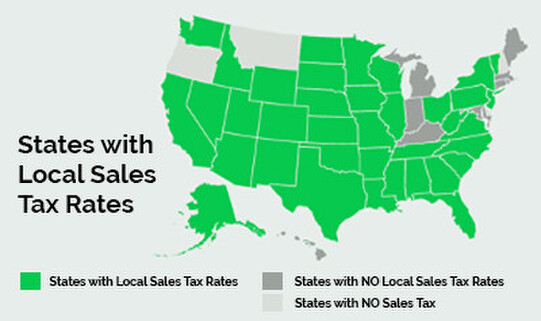US Tax For New Zealand Amazon Sellers
A common question we get asked by New Zealand based businesses wanting to sell into the US on Amazon is what are my US tax obligations?
The article below outlines the tax obligations a New Zealand Amazon seller may face when selling on Amazon US / North America.
What types of taxes are businesses selling into the US on Amazon may be required to pay?
There are 3 types of taxes overseas based Amazon sellers may face in the US:
- Federal Income Tax
- State Income Tax
- State Sales Tax
Federal Income Tax
Whether you are subject to federal income tax can depend on your legal structure and if you are deemed to be “engaged in a trade or business” in the US.
So let’s quickly touch on legal structure.
There is no US tax reason or benefit to set up a US entity (LLC) if you’re a non-US company looking to sell on Amazon. In fact, this could result in you becoming subject to federal income tax, unless you opt for a single member LLC, so isn’t recommended or necessary solely from a tax perspective. There may be other non-tax reasons to use a US LLC and you should seek advice if you are considering this option.
What does “engaged in a trade or business” in the US mean?
If you are deemed to be “engaged in a trade or business” in the US then you will be subject to federal tax. This can be complex and US case law defines what “engaged in a trade or business” means.
For overseas based Amazon sellers the question is:
Does using Amazon FBA services mean I’m “engaged in a trade or business” in the US?
The answer we have been given by US based tax professionals is no. Using Amazon FBA services to sell products in the US does not meet the definition of being “engaged in a trade of business” in the US for Federal Income Tax purposes.
Amazon is engaged in their own business, not your business. They are not specifically trying to sell your products, rather they are a non-exclusive independent agent that has its own business with millions of other clients.
To be engaged in a trade or business in the US you would need to have your own staff on the ground. The use of 3rd party facilities or contractors is not sufficient.
So if your only activity in the US is selling products on Amazon using FBA or another 3rd party provider you are not deemed to be “engaged in a trade of business” and therefore not subject to federal income tax.
State Income Tax
State income tax liability is based on a “nexus” concept.
Having nexus in a state means that a state has the ability to impose state income tax or state sales tax, or both, on a non-resident under its local sales and/or income tax legislation. State income tax nexus is generally based on having an economic presence in a state.
Again this can be complex and the answer we have been given by US based tax professionals is that generally if you don’t meet the definition of being “engaged in a trade or business" in the US, as discussed above, then you won’t have a sufficient nexus to become liable for state income tax.
State Sales Tax
State sales tax is governed at the state level, which means each state gets to make its own rules and laws — within the framework of the U.S. Constitution — when it comes to administering sales tax. Currently 46 states and Washington D.C. have a sales tax and every state’s sales tax laws and rules are different.
State sales tax is also based on the concept of nexus.
However, it is important to note that what constitutes nexus for state income tax purposes is not the same as what constitutes nexus for state sales tax purposes.
For state sales tax, the nexus test is lower, in that there need only be a physical presence in the state. So a lot of states take the position that holding inventory in their state creates nexus for sales tax purposes.
So for Amazon FBA sellers that means storing inventory in an Amazon fulfilment centre will generally create sales tax nexus in that state requiring the collection of sales tax.
The good news is many states with an Amazon fulfilment centre now have a Marketplace Facilitator Law in place.
States with marketplace facilitator laws consider the online marketplace (Amazon) to be responsible for collecting sales tax on behalf of sellers.
States quickly realised that policing marketplace facilitators (like Amazon, eBay, Walmart etc.) instead of individual sellers when it comes to sales tax would make far more administrative sense. There are a lot less of them.
In these states, sellers don’t need to do anything. The tax is added at checkout automatically and collected directly by Amazon.
This is not the case in every state however, so it is important to know which states you have nexus with and whether they will be covered by Amazon.
If they aren’t, you are responsible, so make sure you understand your obligations.
You can check out the rules for each state here, courtesy of TaxJar’s state sales tax map.
If you have economic nexus in states that do not require this of Amazon, you will need to collect and remit sales tax yourself.
If you find yourself in this situation the good news is there is easy to use accounting software solutions to help you do this.
We recommend TaxJar.
TaxJar is a modern cloud based platform that automates sales tax compliance by linking directly with your Amazon seller account. It allows you to automatically file sales tax returns for the state of your choice.
TaxJar is user friendly and easy to navigate. Users can access a range of system functions through the dashboard and view important data such as year-to-date sales totals, gross sales, taxed sales, and sales tax collected.
TaxJar offers a 30-day free trial for you to find out if this is the right tax solution for you.
In Conclusion
If you are a New Zealand based Amazon seller who’s only activity in the US is selling products on Amazon, you usually don’t need to file, pay, or account for, federal tax or state income tax.
For state sales tax the storing of inventory in an Amazon fulfilment centre or other 3rd party facility will generally create sales tax nexus in that state requiring the collection of sales tax.
Most states with an Amazon fulfilment centre now have a Marketplace Facilitator Law in place which requires Amazon to collect sales tax on behalf of sellers. In these states, sellers don’t need to do anything.
This is not the case in every state so make sure you understand your obligations if you have inventory in states without a Marketplace Facilitator Law.
If you would like to discuss the US tax obligations for your New Zealand based Amazon business or need help with your general Amazon Accounting then please don't hesitate to contact us. We are not US tax experts but can help you connect US based tax professionals should you need further technical advice.
Disclaimer: The above information is intended for general education only. The article should not be construed as tax or legal advice. We recommend getting in touch with a qualified tax professional to discuss your circumstances and any topics raised by this article.





